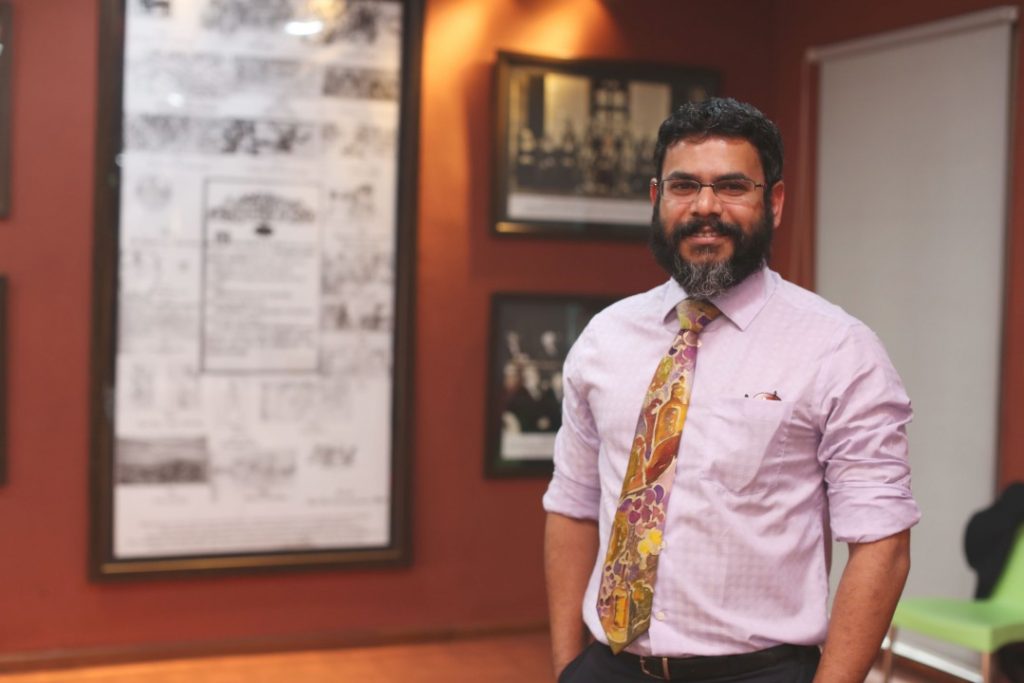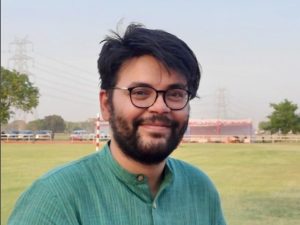
Prof. Arjya Majumdar started teaching at the Jindal Global Law School after a seven-year stint in corporate law. Today he is the Director of Academic Planning, Coordination and Interdisciplinary, as well as the Director of Admissions and Outreach at JGU. Once an “aspiring tram driver” now puts students in the driver’s seat of their careers. The trained mountaineer, now enables them to scale new heights of personal and professional growth.
Prof. Majumdar’s training with Himalayan Mountaineering Institute not only ignited his passion for the environment but taught him an important lesson that when you surmount challenges whether physical or otherwise, you gain in self-confidence. It’s an important takeaway that he seriously hopes to imbibe in his students too. He taught himself to play the guitar when he was 16. It’s probably something to do with him being “intellectually curious” as he describes himself. And with time, he started realizing his passion for varied subjects and areas.
He quotes scientist Ian Malcolm from Jurassic Park as he tries to highlight the importance of interdisciplinarity in higher education. The characters in Hollywood blockbuster were so caught up in finding out whether they could clone dinosaurs that they forgot to ask the question; whether they should. “Those are two different questions from two different perspectives. That’s why interdisciplinary is important. It’s important for the holistic growth of students and in giving them broader perspectives,” he says.
His favorite superheroes are Ironman and Batman. The reasoning is simple, “All other superheroes in DC and Marvel have superpowers. These two are among them because of their intellect, grit and sheer determination.” What fantastic qualities to learn from a superhero, we mean, a faculty, who practices what he actually preaches!
Finding his passion and the roller-coaster of Corporate Law
As a young boy growing up in pre-liberalized West Bengal, Prof. Majumdar nurtured his love for theater, culture and music. Growing up in a middle-class family background, along with the social and political milieu of Kolata dealing with frequent strikes in Kolkata meant things weren’t always easy. “It gave me a huge benefit in terms of opening my mind and my horizons. It was a brilliant time, which in many ways raised my intellectual curiosity, wanting to try out different things” he says.
By the time Prof. Majumdar had completed his high school education from St. Joseph’s College, his childlike interests of becoming a tram driver had evolved into being a journalist. The road to NUJS had actually put a spanner in his wheels. “The entrance test result made me realize that there are many learned people studying law, and that they think I might be worthy of it too. So, I gave it a shot, enjoyed it and soon after my BA LLB went to Tulane University, US for my Masters,” he adds.
Soon after his Masters, Prof. Majumdar joined the corporate law firm Fox & Mandal and stayed on for 4 years. Within three months of his joining the firm, he was asked to man their London office. It was practically unheard of for a first year Associate. The high was followed by the low of the 2008 global financial crisis. “I went without a salary for three months but continued to work. It was an interesting and humbling time,” he says in retrospect. He would go on to join Desai & Diwanji, another corporate law firm later on.
Industry’s loss, academia’s gain
Prof. Majumdar joined JGLS in 2013 and teaches corporate law and ancillary subjects at the university. He is also the Director for Academic Planning, Coordination and Interdisciplinarity and looks after the university’s rankings. “Within a span of ten years, the university have made it to the top 2.67% of all universities globally. We hope to better our position in the world rankings in the future. The quality of our alumni in the industry and our academic network gives us our reputation,” he says proudly.
Network and reputation to boast of
In a short span of 10 years, JGU has mustered 250 international collaborations with top universities around the world. Prof. Majumdar asserts that there has been a dedicated effort to be more international and this is revealed in the university’s research focus as well. “We offer substantial rewards to faculty members to publish in top journals. We consistently try to build as many quality partnerships all over the world as we can,” he speaks of the efforts.
What makes JGU global?
According to Prof. Majumdar, there are three distinct reasons why JGU is a truly global university. Firstly, the university hires faculty with at least one international degree or international experience. “Secondly, our courses are steeped in the globally accepted practices and conform to globally accepted curricula. Finally, our pedagogies are global in nature, like the emphasis on case studies, which is followed at Harvard Law School,” he explains.
Hurdles for interdisciplinarity in India
Traditionally India has tried to set itself apart through super specialty. As early as in class 11th students are asked to choose between Science, Commerce, Arts, Humanities etc. “The problem with this is that you fail to understand that there is a world beyond your discipline. A law student should know a bit about finance and business. How else do you advise a client on business law? That has become a cornerstone to our approach to interdisciplinarity,” he adds.
Interdisciplinarity at JGU
With its eight schools, JGU has an inherent advantage that lends itself to interdisciplinary learning. Prof. Majumdar talks about the cross-listed electives from different schools that can be chosen by all students at the University. “We find that the students who do take up the cross-listed electives tend to have a better understanding of the world they live in. For future professionals and leaders, it’s really important to have such holistic education,” he claims.
The man behind the academic
Ask Prof. Majumdar one world problem he would like to fix, and pat comes the reply – climate crisis. Anything he would like to change about his life? He ponders and says that he regrets not studying engineering or an MBA but adds that he wouldn’t trade his life at all. Book he wants to write? “It would be to my son telling him about my life and mistakes I have made. Hopefully he won’t follow mine but make his own.” It’s something he wishes for his students too.


